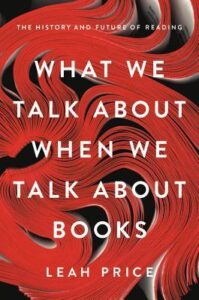 What We Talk About When We Talk About Books, Leah Price
What We Talk About When We Talk About Books, Leah Price
This book is less concerned with what’s inside books and more about what we do with the actual physical book. Leah Price is a book historian as well as a literary critic, and the reason I bought this book was for her insights on how we read and how you delve into how people in the past read. With some old books it’s easy: you can tell by whether the pages are cut or not. In cookbooks, you might be able to tell from where the pages are stuck together or splattered with ingredients. There’s also folded-over corners, of course, and just letting the book fall open and see where it opens to… Price talks a little about these considerations, but mostly this isn’t what the book is about.
She discusses the physical form of a book in the first chapter, the joys of pre-owned books and scribbling in the margin, and even how those habits have evolved over time. Much as we like to think of the book as a well-worn and traditional object, we haven’t always read from folded wood-pulp paper folded into covers, and our habits around books have changed accordingly. Books haven’t always been affordable, either: subscription libraries where people clubbed together to buy and share books were once very common. Scribbling in the margins and doing underlining was a lot more common before modern libraries discouraged the practice.
(I fear Price wouldn’t think much of my shelves, which are loaded which books kept in almost mint condition, even when I’ve read them. I think she’d see them as lacking personality and even love, instead of finding my rather obsessive, jealous, hoarding love of books on every single shelf. Not much room for nuance in her words here, approving most of books where she can clearly see the fingerprints of previous readers.)
Price also discusses the big one: pbooks versus ebooks. She’s fairly nuanced, and mentioned some fascinating insights about how different countries consume their ebooks. (In France, apparently, mostly via laptop screen; in the UK, dedicated readers giving way to reading on phones.)
She’s also got some things to say about the uses books are put to, discussing the book prescriptions service provided in Wales (which I’ve used!) and so on. To be honest, this seems like a bit of a mish-mash of subjects, and it doesn’t really come together very coherently. I was most interested in the first chapter and her commentary on ebooks, and I’m glad to have picked up her term for physical books (pbooks) — way easier to say than “dead-tree books” — but… overall… I wasn’t that enthused? It took looking at the contents to refresh my memory on what she even said, which isn’t a super great sign.
In the end, I’m not sure what she wanted to say and whether she ended up saying it.

I tend to look at chapter titles too as a rule of thumb indication of the worth of a book as well as an aide-memoire for a review, but the fact you’re lukewarm about this title (is a 2/5 lukewarm? or dismissive?) means I’d probably just scan it in a bookshop before putting it back. But, yes, ‘pbook’ is a good term to distinguish it from ebook, I shall borrow that too!
I’d say lukewarm — I actually read the book almost all in one go, because I was really interested in the topic… I just found the results kind of meh. Not so much sorry I spent the time, because it was enjoyable enough, but hesitant to recommend because “enjoyable enough” isn’t really good enough!
Ah, yes, I always bristle when people suggest a book that’s in good condition isn’t ‘well-loved’ enough. I treat my books the same as you. I love and care about them, so I try to preserve them as best as possible.
Exactly! I want to take care of my books!